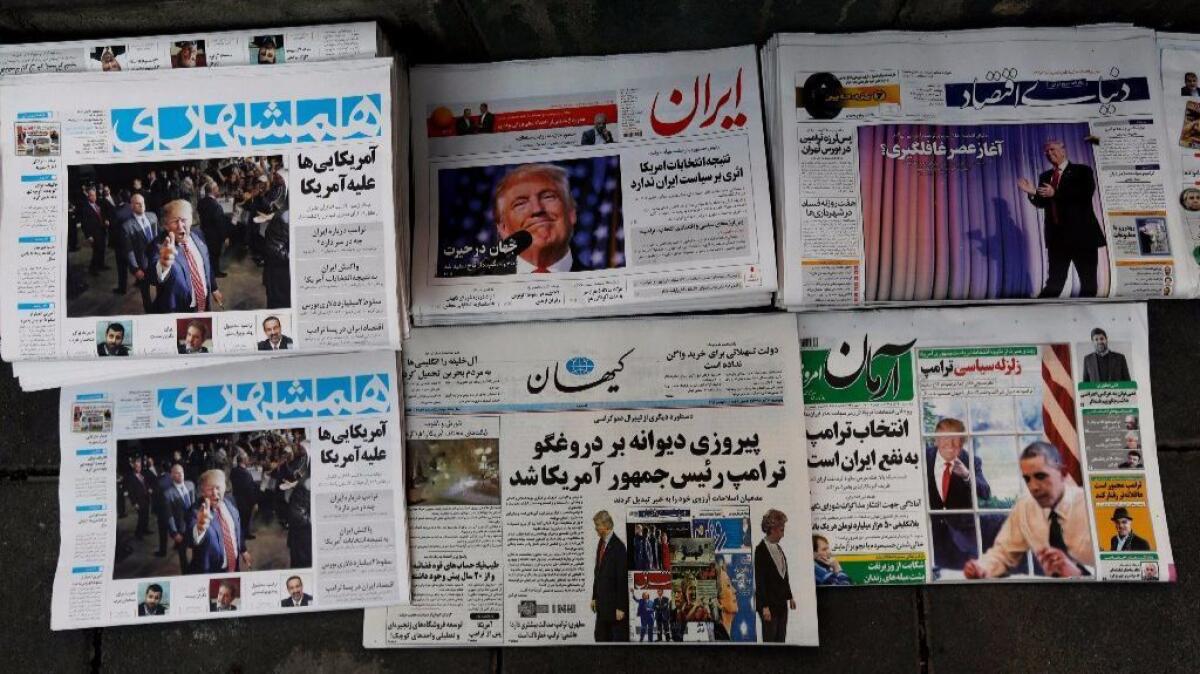Trump’s plans to scuttle or amend the Iran nuclear deal remain a work in progress

President Obama said Monday that the historic accord to curb Iran’s ability to develop nuclear weapons — the most important arms control agreement in decades — is working, and he expressed hope that Donald Trump will keep it intact.
“My suspicion is that when the president-elect comes into office … he will look at the facts,” Obama said at a news conference. Abandoning the deal would remove obstructions that blocked Iran’s nuclear capabilities and could force the United States to sanction European allies that continued to honor the accord.
“When you are not responsible for it, you can call it a terrible deal,” Obama said. “When you are responsible … you are more likely to look at the facts.”
The question remains whether the deal, ratified by six world powers and implemented under a United Nations Security Council resolution, will survive under a Trump administration.
As a candidate, Trump targeted the Iran deal with special scorn but wavered on his intentions. He vowed at times to tear it up and at other times indicated he would negotiate stiffer concessions from Iran.
In speeches, he vastly inflated Iran’s financial gains from the agreement, suggesting Tehran benefited unfairly. And he complained that it only limited Iran’s nuclear weapons program, not its ballistic missiles or other issues of concern to U.S. policymakers.
But the United States enforces separate sanctions related to Iran’s ballistic missiles, its support for foreign terrorist groups and human rights abuses. The Treasury Department twice added sanctions to Iranian companies and individuals this year after the nuclear deal went into effect.
“We have seen that this agreement has done what we said it was going to do, which is limit Iran from obtaining a nuclear [weapon],” said Mark Toner, the State Department spokesman. “It wasn’t focused on changing Iran’s behavior at large. It was focused on preventing it from obtaining a nuclear weapon.”
Trump’s advisors make clear that revisiting the agreement is a priority for Trump even if the plan ahead is still a work in progress.
‘Ripping up’ is maybe a too strong a word. He’s gonna take that agreement, it’s been done before in international context, and then review it.
— Walid Phares, Trump foreign policy advisor
“‘Ripping up’ is maybe a too strong a word. He’s gonna take that agreement, it’s been done before in international context, and then review it,” Walid Phares, a Trump foreign policy advisor, told BBC radio. “He will take the agreement, review it, send it to Congress, demand from Iranians to restore a few issues or change a few issues. And there will be a discussion. It could be a tense discussion.”
Another advisor, R. James Woolsey Jr., who headed the CIA from 1993 to 1995 under President Clinton, was more hawkish. Speaking on CNN, he called the deal “the worst single international agreement the United States has ever signed.”
Woolsey said the deal was neither implementable nor verifiable.
“It is truly rotten,” he said.
Under the Joint Comprehensive Plan of Action, as the deal is formally known, Iran has met its commitments to curtail access to nuclear fuel and technology and is submitting to verification systems set up to monitor its compliance, according to the U.N. nuclear watchdog agency.
U.S. officials and most arms control experts say Washington would be isolated if it withdraws from the deal.
It could put the United States in violation of the Security Council resolution that it endorsed, kill any chance of another diplomatic deal with Iran and hurt U.S. credibility with the five other major powers who negotiated it: England, France, China, Russia and Germany.
Even Israel, which fiercely opposed concessions to the Islamic Republic during the negotiations, has accepted that the deal is working and that Iran no longer poses an imminent nuclear threat.
Worse, according to arms control experts, it could give Iran a free hand to cast off its commitments — and give the U.S. few options short of military force to respond.
“Iran would be free to resume its nuclear program, and it would be difficult to impose new sanctions,” said Gary Samore, a former arms control advisor to Obama who now is research director at the Belfer Center for Science and International Affairs at Harvard.
The Trump administration “would end up with furious allies and the resumption of Iran’s nuclear program,” agreed Cliff Kupchan, chairman of the Washington-based Eurasia Group, a risk-assessment firm. “This has gone from a deal that was working to one that is at risk.”
The Obama administration argues that the deal effectively closed off all the pathways that Iran could pursue to obtain a bomb: by enriching uranium, producing plutonium or buying technology from other countries.
Under the terms of the pact, Iran removed the core of a heavy water reactor under construction at Arak that ultimately could have produced plutonium, then filled the reactor with cement.
It dismantled or mothballed thousands of fast-spinning centrifuges, which are used to enrich uranium to bomb grade, and it shipped nearly its entire stockpile of enriched uranium to Russia for reprocessing.
U.S. officials said those steps extended Iran’s so-called breakout time — the period it would need to build a bomb — from two to three months to more than a year. That’s enough time for the world to respond should Tehran decide to rush for a bomb, advocates say.
In exchange, key financial and trade sanctions were lifted from Iran, giving it access to the international financial system and global markets for the first time in years, as well as more than $50 billion in assets frozen abroad since the country’s 1979 revolution.
There are several ways a Trump administration could kill or undermine the deal.
The most likely strategy is to make new demands, such as insisting on more intrusive inspections on Iranian facilities or bases, or for a longer period before Iran can again enrich uranium.
Iran would likely refuse — putting the onus on Washington to either abrogate the treaty or continue to abide by it in some form.
Trump also could decline to renew sanctions relief. As the deal is crafted, the suspension of various U.S. sanctions has to be renewed by the president every 120 or 180 days. But other countries, which have largely lifted sanctions, are unlikely to reimpose theirs.
The agreement was harshly criticized by many Republicans, who said Iran could not be trusted and doubted that its nuclear program was truly crippled. A GOP-led effort to block the accord in Congress failed last year amid Republican infighting and a Democratic filibuster.
When Trump met with Obama for the first time at the White House on Thursday, the president spent a good amount of time explaining the complexity of the deal, administration officials say.
“We obviously believe in the importance of the Iran deal, which had significantly rolled back Iran’s nuclear program and averts yet another conflict in the Middle East,” said Ben Rhodes, Obama’s deputy national security advisor.
Administration officials will “run through the tape” with Trump’s advisors, he added. “And then the new team will make their own determinations. And we respect that every administration will make its own judgment.”
For more on international affairs, follow @TracyKWilkinson on Twitter.
ALSO
LAPD will not help deport immigrants under Trump, chief says
Obama will spend his final presidential trip abroad trying to reassure the world about Trump
More to Read
Start your day right
Sign up for Essential California for news, features and recommendations from the L.A. Times and beyond in your inbox six days a week.
You may occasionally receive promotional content from the Los Angeles Times.







